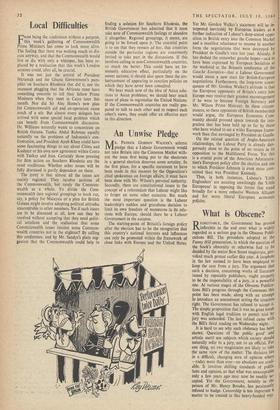Local Difficulties
FROM being the conference without a purpose, this week's gathering of Commonwealth Prime Ministers has come to look more alive. The feeling that there was nothing much to dis- cuss anyway, and that the Commonwealth would live or die with only a whimper, has been re- placed by a realisation that this week's London sessions could, after all, be crucial.
It was not just the arrival of President Nkrumah and the Ghana Government's pam- phlet on Southern Rhodesia that did it, nor the incessant plugging that the Africans must have something concrete to tell their fellow Prime Ministers when they meet in Cairo later this month. Nor did Sir Alec Home's new plan for Commonwealth aid and co-operation cause much of a stir. But almost every delegate has arrived with some special local problem which can benefit from Commonwealth discussion. Dr. Williams naturally wants to concentrate on British Guiana, Tunku Abdul Rahman equally naturally on the problems of Indonesia's con- frontation, and President Ayub Khan could have some fascinating things to say about China and Kashmir or his own new agreement within Cento with Turkey and Iran. Certainly those pressing for firm action on Southern Rhodesia are the most vociferous. Whether other issues will be fully discussed is partly dependent on them.
The irony is that almost all the issues are mainly regional. They involve sections of the Commonwealth, but rarely the Common- wealth as a whole. To divide the Com- monwealth into regional groupings to work out, say, a policy for Malaysia or a plan for British Guiana might involve adopting political attitudes unacceptable to other members. Yet if such issues are to be discussed at all, how can they be resolved without accepting that they need politi- cal solutions and the realisation that some Commonwealth issues interest some Common- wealth countries not in the slightest? By calling this conference, and by Mr. Sandys's plain sug- gestion that the Commonwealth could help in
finding a solution for Southern Rhodesia, the British Government has admitted that it must take note of Commonwealth feelings or abandon it altogether. Regional groupings, it seems, are going to be forced upon it. The essential point is to see that they remain ad hoc, that countries outside the particular regions are consistently invited to take part in the discussions. If this involves calling in non-Commonwealth countries, so much the better. This could have an im- mensely educative effect, particularly on the newer nations; it should also spare them the em- barrassment of appearing to sanction policies on which they have never been consulted.
We hear much now of the idea of Asian solu- tions to Asian problems; we should hear much more of plans to regionalise the United Nations. If the Commonwealth countries are really pre- pared to talk to each other and to respect each other's views, they could offer an effective start in this direction.










































 Previous page
Previous page